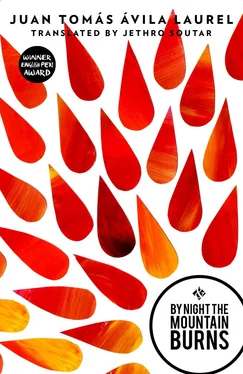Juan Ávila Laurel - By Night the Mountain Burns
Здесь есть возможность читать онлайн «Juan Ávila Laurel - By Night the Mountain Burns» весь текст электронной книги совершенно бесплатно (целиком полную версию без сокращений). В некоторых случаях можно слушать аудио, скачать через торрент в формате fb2 и присутствует краткое содержание. Год выпуска: 2014, Издательство: And Other Stories Publishing, Жанр: Современная проза, на английском языке. Описание произведения, (предисловие) а так же отзывы посетителей доступны на портале библиотеки ЛибКат.
- Название:By Night the Mountain Burns
- Автор:
- Издательство:And Other Stories Publishing
- Жанр:
- Год:2014
- ISBN:нет данных
- Рейтинг книги:5 / 5. Голосов: 1
-
Избранное:Добавить в избранное
- Отзывы:
-
Ваша оценка:
- 100
- 1
- 2
- 3
- 4
- 5
By Night the Mountain Burns: краткое содержание, описание и аннотация
Предлагаем к чтению аннотацию, описание, краткое содержание или предисловие (зависит от того, что написал сам автор книги «By Night the Mountain Burns»). Если вы не нашли необходимую информацию о книге — напишите в комментариях, мы постараемся отыскать её.
By Night the Mountain Burns — читать онлайн бесплатно полную книгу (весь текст) целиком
Ниже представлен текст книги, разбитый по страницам. Система сохранения места последней прочитанной страницы, позволяет с удобством читать онлайн бесплатно книгу «By Night the Mountain Burns», без необходимости каждый раз заново искать на чём Вы остановились. Поставьте закладку, и сможете в любой момент перейти на страницу, на которой закончили чтение.
Интервал:
Закладка:
The day arrives and the half-formed canoe is fastened with a long, thick rope, a rope that has been brought along especially by its owner. Indeed that rope is used for one thing and one thing only on our Atlantic Ocean island, and its owner has long felt obliged to let it be used for that purpose. The maestro ties the rope around the trunk in such a way that those pulling can get a good purchase without the canoe coming to any harm and without those pulling the canoe coming to any harm either. Next, those who know about such things chop down a banana tree, or a different tree of similar size, and cut the branches into rollers the canoe can slide along. The paths on our Atlantic Ocean island are rough, the trails are extremely stony and there are many steep inclines. All of which means that pulling a canoe to its final destination involves a lot of hard, dangerous work. And because there are not an infinite number of rollers, or even enough to cover the entire route to the nearest feasible shore, the way it works is this: after each small stretch, once the run of the rollers is used up, strong young men take them from the back and return them to the front, so that the half-hollow trunk can slide over them again, that’s to say, so that the process is repeated. Have I mentioned the inclines on our Atlantic Ocean island? Well, this means that the trunk doesn’t always slide along the trail as intended, even though the route has been chosen so that those pulling hopefully won’t fall off the path. Therefore other men, typically younger men with some experience of canoe pulling, place themselves at the front of the canoe armed with sticks, sticks they’ve cut and stripped down especially, and they prod the canoe to straighten its course.
The half-made canoe is pulled along by human force, one single force drawn from many different men and women, with many different physical aspects and motivations. The whole thing is done so that lots of individual pulling becomes one united thrust. But how is it done? After all, herein lies the secret of how that shell of a canoe gets from the bush to the nearest feasible shore. It needs someone who knows how to make lots of little energies come together at the right moment and become one giant mass of energy. That someone is the maestro and he does it by singing, which means he has to have the dual qualities of being a boat-carpenter and a singer. To those dual qualities you might also add that he needs to be tough, because sometimes he has to sing and take his turn pulling on the rope at the same time. His is a rare yet essential skill, the ability to orchestrate everyone’s efforts through song, uniting the exertions of men and women of different physical aspects around one half-made canoe. He knows they will heed his call. So let’s go back to the beginning and sing the song once more:
Aaale, toma suguewa,
Alewa!
Aaaalee, toma suguewa,
Alewa!
The wise old man opens his throat and sings, like a great maestro, the first part of the song. Then the friends of the owner of what will soon be a canoe, and the friends of those friends, cry: Alewa! This, as you can hear, is a word with three syllables. The men and women dedicated to this arduous task answer at the tops of their voices, for it could hardly be a conversational reply, and they put the emphasis on the second syllable, in tandem with the force they apply to the rope. The middle part stands out — aLEwa — and the canoe, which all of them treat as their own, gains traction:
Aaale, toma suguewa,
Alewa!
Aaaalee, toma suguewa,
Alewa!
So you could say alewa is the ho of heave-ho, or you could make a more literal translation, like this:
‘Will you give it a pull?’
‘We’ll PUll!’
And on the PU comes the unified force that moves the canoe along another stretch in its journey to the nearest feasible beach. For short journeys, for example from the wetlands to an area of the beach safe from the waves, there is a shorter version of the song in which no one leads and everyone chants the Alewa part over and over again, until the final destination is reached. Or until the next resting point, where there’s a pause while the stronger ones reset the rollers, and then everyone starts the chant again, and so on until the final destination. But when what you want to drag lies several miles from the coast, deep inside the bush, and involves navigating difficult paths, dangerous inclines, stony trails and other hazards and perils, the only version of the song that’s sung is the one I’ve been singing. It doesn’t matter if there are several resting points over the long journey. When the pulling gets going again, everyone falls back in with the song, though the conductor of the orchestra is eventually changed. Yes, I call it an orchestra, because there are so many men and women, and they all sing at the tops of their voices in order to keep spirits up. Neighbours on nearby malanga plantations, or plantations of cassava, yam or plantain, neighbours who will typically be mothers with little children, hear the song from wherever they are and know right away what’s happening. The song is the same everywhere on the island, and there is no other event or activity when it is sung. So they might come across the pulling procession on their way home, but even before that, whether they have been on high ground or low ground, they’ll have heard the song making its way through the silent bush:
Aaale, toma suguewa,
Alewa!
Aaaalee, toma suguewa,
Alewa!
If there were too few people on our Atlantic Ocean island, too few strong people, we obviously wouldn’t be able to fish in canoes. There would be no need to ask a woman to have a malanga soup ready at a particular hour of a particular afternoon, and nobody would sing to pull a half-made canoe to its final destination.
Has anyone worked out why the canoe is not finished where its mother tree is felled? If it were done there, the effort needed to move it would certainly be reduced. But have I mentioned the number of rocks there are on the island? I said the island lay in the middle of the Atlantic Ocean, but did I mention the unevenness of its terrain? A canoe that left the bush finished and polished would reach the coast snapped in two, no matter how much care was taken. And then all the singing, all the cooking, all the pain and effort put in over so many hours, would have come to nothing. And this would be very upsetting for the owner of the canoe, for the maestro who built it and for everyone who took part in the pulling. And the owner of the rope used to pull the boat, he’d be upset too. And if it were to snap when the malanga soup was already prepared, everyone would sit down disappointed and eat the soup in silence. The song would be left hanging in the air, unaware as to why it had been sung with such vigour and heart:
Aaale, toma suguewa,
Alewa!
Aaaalee, toma suguewa,
Alewa!
Like I said, that little song fills me with nostalgia and makes me think of all the people who lived on the island when I was a boy, and it makes me think of my grandfather.
I can’t say for sure whether my grandfather was or wasn’t mad. I saw him through a child’s eyes and through such eyes it’s impossible to tell whether an adult man, who lives in your house and who you’ve been told is your grandfather, is mad or not. Whether an adult is mad or not is not something easily understood by a little boy, who judges things with the eyes of his age, or doesn’t in fact judge them at all. But grandfather didn’t go unnoticed by me or by the other children living in the house. What I mean by saying he didn’t go unnoticed is that, if it hadn’t been for someone I loved and trusted telling me in a reassuring voice that as well as living in the house he was a member of the family, I’d have been very afraid of him and would have avoided him at all costs.
Читать дальшеИнтервал:
Закладка:
Похожие книги на «By Night the Mountain Burns»
Представляем Вашему вниманию похожие книги на «By Night the Mountain Burns» списком для выбора. Мы отобрали схожую по названию и смыслу литературу в надежде предоставить читателям больше вариантов отыскать новые, интересные, ещё непрочитанные произведения.
Обсуждение, отзывы о книге «By Night the Mountain Burns» и просто собственные мнения читателей. Оставьте ваши комментарии, напишите, что Вы думаете о произведении, его смысле или главных героях. Укажите что конкретно понравилось, а что нет, и почему Вы так считаете.












